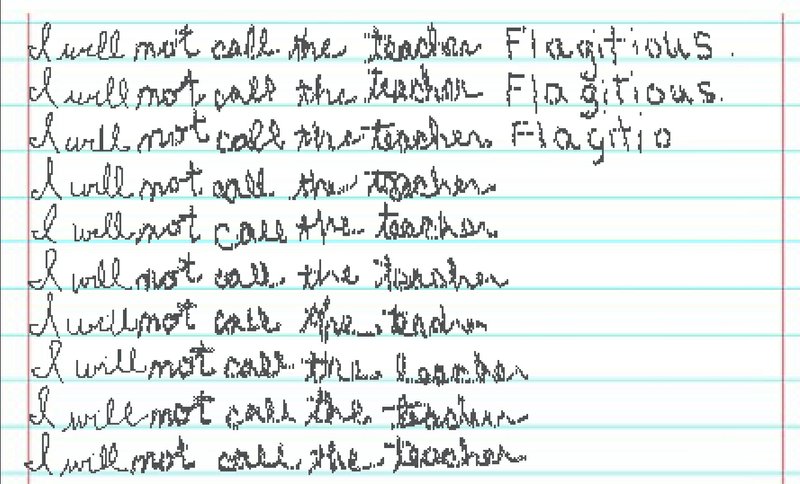English has so many enticing words associated with mischief. No wonder we keep getting into trouble.
"Rambunctious" is a fantastic adjective meaning noisy, unbridled exuberance. The Americans altered the spelling to make it sound less like its older British cousin, "rumbustious." I'm uncertain whether rum contributed to the boisterousness. (It often does.)
"Obstreperous," another adjective, means noisily unruly. It comes from the Latin roots meaning one who is highly pro-noise, usually in protest of something.
"Nefarious" means exceedingly wicked or having offensive conduct. It contains the Latin root meaning "crime."
"Reprehensible" describes a bad person who deserves ample criticism. That word has been around since the 14th century, so bad behavior must not be at all new.
I just learned "flagitious," which means villainous. It comes from a Latin word meaning "shameful thing." It's also related to the Latin word meaning "whip." Flagitious almost rhymes with delicious, with the accent on the second syllable, "gi."
And we have plenty of nouns that mean poor conduct. My favorite is probably "rapscallion." It means "villain" and is an alteration of an older word, "rascal." Rapscallion sounds like something a soldier in armor might say to a combatant. "You rapscallion! Prepare to die."
"Scalawag" or "scallywag" is a word that has gotten around. It's a young troublemaker or scamp, and today it has more of a harmless association. The word's origin is unknown, but it has had other meanings. For a while, a scalawag was a sickly animal. Then it was a person with a bad reputation. After the Civil War, a scalawag was a Southerner who profited by collaborating with Northerners involved in Reconstruction. Not cool, scalawag.
I love the sound of "shenanigans." It means deceptive practices or youthful misbehavior. It appeared around the 19th century, but its origin also is unknown.
"Legerdemain" originally was an illusion of the hands, such as a magic trick. Or that weird, inebriated uncle who keeps pulling quarters out of your ear. I love that the phrase from French means "light of hand." People who spoke English borrowed it and decided it would mean the same as "sleight of hand." That phrase meant a sly use of the hands, so it fits. Now that we are in the age of virtual everything, one can perform legerdemain even without hands, such as statistical or financial trickery.
"Subterfuge" is a deception for some kind of gain. It's from the Latin roots meaning "secretly" and "to flee."
"Skulduggery" sounds like the unearthing of skulls, no? (Not a lucrative pastime, I'd guess.) But its meaning is nearly the same as subterfuge. It's also sometimes spelled "skullduggery." Word experts aren't certain about the origin, but they don't think skulls were involved.
"Chicanery" means trickery. It was borrowed from the French word that's nearly the same, "chicanerie." Apparently, the French had a word for everything, and the English did not.
And just one more. "Jiggery-pokery" isn't something you hear often. It means deception or fraud and has been used since the late 19th century. The late Supreme Court Justice Antonin Scalia loved words like this. He used the phrase in 2014 in his dissenting opinion to the Affordable Health Care Act.
OK, I feel that I have adequately prepared you to be an informed, raucous member of the audience at any looming political debate.
FORLORN OR LORN?
You'll sometimes hear that a person is "forlorn." It means someone is hopeless and lost. Think of Winnie-the-Pooh's cohort, Eeyore. It comes from the Middle English root meaning "lost."
Now guess what "lorn" means. It means forlorn, and it has the same root. What kind of jiggery-pokery is that? It's rarely used these days, though.
THE TABLE TABLEAU
A few weeks back, I wrote that "to table" can mean to wait to discuss an agenda item at a business meeting. Then I said that "to table" also means to discuss an item.
As it turns out, the first definition is that used in the United States, while the second definition is used in Britain. I'm sorry I didn't get that right. I know the Colonies rebelled against the British monarchy, but I'm not sure who chose to rebel with that particular definition.
Sources: Merriam-Webster, Thesaurus.com, Time magazine, American Heritage Dictionary, Oxford Dictionaries, The Word Detective, World Wide Words
bkwordmonger@gmail.com
Style on 08/05/2019
